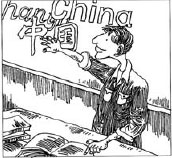Warding off the English invasion
Updated: 2007-08-31 07:15
A reader of China Daily recently wrote to voice his support for the preservation of Chinese culture after reading the article entitled "English invades Chinese language".
"We must not abandon our Chinese culture", the reader said. He had my agreement on this point of view. But I see "the invasion of English" in a different way.

When I say "invasion", I am not referring to the use of English words among Chinese characters, although some people do use abbreviations such as "CEO", "DVD" and "GDP". That is a relatively minor issue.
A much more serious problem is the use of English grammar in the Chinese language.
For some reason, many mainlanders and Hongkongers write in their national language as if they are writing in English.
The current form of our written language has undergone almost a century of evolution. It was born during the May Fourth New Literature Movement in the 1920s, when classical Chinese gave way to the vernacular.
"We write what we speak," said Hu Shi, one of the most celebrated vernacular writers.
In the early days, when the pioneers of the new literature movement were still groping for the way forward, it was understandable that vernacular Chinese was affected by foreign languages, though some influences, such as the introduction of punctuation, were beneficial. The language gradually matured over the decades, but now the foreign influence seems to be creeping back.
The Europeanization of the Chinese language can be seen in, for example, the use of passive voice, plurals and long sentences.
In English, the passive voice is used when the emphasis is on the action and not the executor. It is also used to make the writing sound more formal. In Chinese, the passive voice was used much less frequently in the past, and was usually used to describe unpleasant situations such as "bei sha" (killed). Now Chinese writers seem to have acquired a strong affinity for the passive voice, which they use everywhere.
Terms like "nimen" (plural you), "women" (we) and "tongzhimen" (comrades) sound entirely natural, but when we start adding the word "men" (the Chinese word indicating that the preceding noun is plural) to other nouns, they sound awkward. We can tell in the Chinese language whether a noun is plural by looking at its context. Adding "men" is not necessary in most cases. On the other hand, if we think using "men" like "s" in English is an improvement to our language, why don't we use it for all countable nouns that are in the plural? Chinese writers tend to be very inconsistent in their use of "men". They use it when they feel like doing so. There are no rules governing the usage at all.

The most problematic adoption, however, is the use of long sentences, which make much writing almost unreadable. Since the Chinese language has less stringent grammatical rules, sentences must be short and compact to avoid ambiguity. The difference between English and Chinese can be seen in the necessity, according to textbooks, for a translator to break down sentences into shorter ones when translating the former into the latter.
The use of unnecessary conjunctions has also been copied from English. We have also seen the outright adoption of English phrases and proverbs, among other things. One could write a book on the situation.
If we are serious about protecting Chinese culture, maybe we should begin by preventing our language from being Europeanized.
A distinctive Chinese language contributes to linguistic diversity, the very thing that makes the world's cultural heritage so colorful and admirable.
E-mail: zouhr@chinadaily.com.hk
(China Daily 08/31/2007 page10)
|
|
|
|
|
|